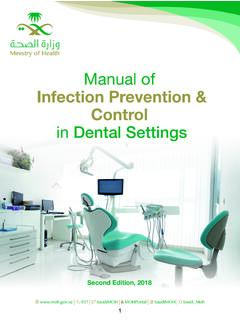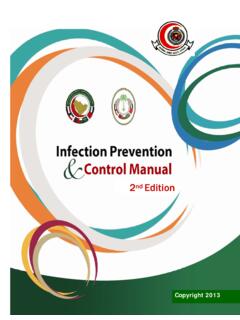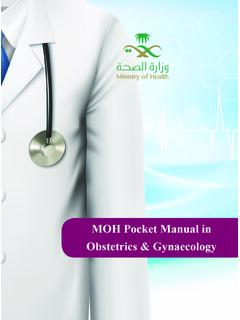Transcription of Health Sector Transformation Strategy
1 Health Sector Transformation Strategy The Custodian of the Two Holy Mosques Salman bin Abdulaziz Al Saud His Royal Highness Prince Mohammad bin Salman bin Abdulaziz Al Saud The Crown Prince, First Deputy Prime Minister and Minister of Defense Contents Contents 1. Introduction 7. 2. The need for Transformation 9. - Why do we want to change? 3. Defining the Transformation goals and methods 13. - What do we want to change? Using theory and applying it to our Strategy . 4. Delivering the Transformation 24. - How and when will things change? 5. Perceived risks and mitigations 29. - What do we want to avoid?
2 6. The economic case 32. - Do the benefits outweigh the costs? 7. Next steps 34. 8. Annexes 35. A. Plans by Themes 36. B. A description and summary analysis of the Harvard and Oxford Value frameworks 59. C. Bibliography of key documents (with hyperlinks) 63. D. Endnotes 64. 5. Introduction Introduction Good Health is a gift. Its promotion is amongst the greatest responsibilities of any State. We take that seriously and are now embarking on a fundamental Transformation of our Health system . Our country needs it. Our people deserve it. Our population is growing. It's also growing older.
3 Living longer is a blessing but it also brings challenges as do our more diversified economy and increasingly urban lifestyles. Every one of us has a role to play and our attitude towards our physical and mental wellbeing, as well as the system that supports it, must change if we are to achieve our ambition of living fulfilling lives in a vibrant society. Future success relies on us being smart, sophisticated and less centralized. We must draw on what we've achieved in the past but not be held back by it. Healthcare staff need to be empowered to make the right decisions at the right time in the right place.
4 They need the authority to take action, make choices and accept responsibility. They must also be given the chance to make honest, well-intentioned mistakes without undue fear of failure. The scale and complexity of this Transformation cannot be overstated. That is why it has been broken down into themes and will be executed in phases. We have sought to balance ambition and realism. This paper gives an overview of the Transformation , spelling out the underlying goals as clearly and coherently as possible. Delivering the Strategy will be more complex and will only work if we can engage and co-ordinate large numbers of highly educated and skilled people effectively.
5 Context The Ministry of Health (MoH) has been tasked with delivering this Strategy as part of Vision 2030 for the Kingdom of Saudi Arabia [1]. This document addresses the Level 2 Strategic Objective of raising the standards of our Health service, the Level 3 goals of easing access to it, ensuring better value and strengthening prevention against the main threats to our Health . The Strategy also aims to make a significant contribution to Level 2 Strategic Objective : Promote a healthy lifestyle. Though led by the Ministry of Health ; this plan has been developed in close collaboration with the National Transformation Program.
6 7. The Need for Transformation - Why do we want to change? The Need for Transformation Understanding the challenges [2]. We have identified eight major challenges in our Health system that need to be addressed over the coming decade. 1. The population of the Kingdom continues to grow and age. Our population is expected to rise from million in mid 2018 to million in mid 2030. The number of elderly (aged 60 to 79) is expected to grow from million in mid 2018 to million in mid 2030. In 2015 residents from overseas amounted to 30% of the population of the Kingdom or 10. million people. These are mainly adults but also with some accompanying young people.
7 We have many overseas visitors too, particularly for the major religious festivals. Two years ago, 537,000 of those attending the Hajj were domestic pilgrims. 1,325,000 came here from abroad and in some years the total number of foreign pilgrims visiting Mecca has been estimated as high as three million people . [3]. The population of the KSA was urban in 2016, which is projected to rise to in 2030. 2. Rates of avoidable injury and non-communicable disease remain high by regional and international standards. The Kingdom has made notable progress in improving the Health of its population over recent decades, particularly in areas of child and maternal mortality and the reduction of communicable disease.
8 For both males and females, life expectancy at birth improved from 64 years in 1970 to 75 years in 2015. There are targets set to ensure it increases to 80 years by 2030. But there is considerable scope to reduce avoidable mortality and avoidable morbidity in both the working and elderly populations. Particular areas of concern include heart disease, stroke, diabetes mellitus, respiratory disease, mental Health , road traffic accidents and congenital diseases, all of which are amenable to reduction. We need to strengthen the prevention of non-communicable disease and injury thereby reducing avoidable illness and death.
9 The risk of major outbreaks of communicable disease also remains substantial, especially at Hajj or following natural or man-made disasters. 9. The Need for Transformation When other government departments in the Kingdom develop major policy initiatives, the Health and healthcare implications of their actions are not always at the front of their minds. Similarly, it has often proved difficult for the MoH to develop the inter-ministry dialogue necessary to resolve some of its own pressing problems. 3. Primary care remains inadequate and inconsistent. Secondary and tertiary hospitals, and associated resources, are poorly distributed across the Kingdom.
10 [4] There is inadequate capacity in extended care services such as rehabilitation, long-term care and home care. These issues are compounded by low levels of productivity. 4. There are significant gaps in the quality of services provided to patients. Much of this is due to lack of consistent protocols and pathways for treatment, and incomplete measurement of patient processes and outcomes. The Saudi Central Board for Accreditation of Healthcare Institutions (CBAHI) Essential Safety Requirements Survey of 2015 has also emphasized key deficits in safety across all categories of hospitals.











